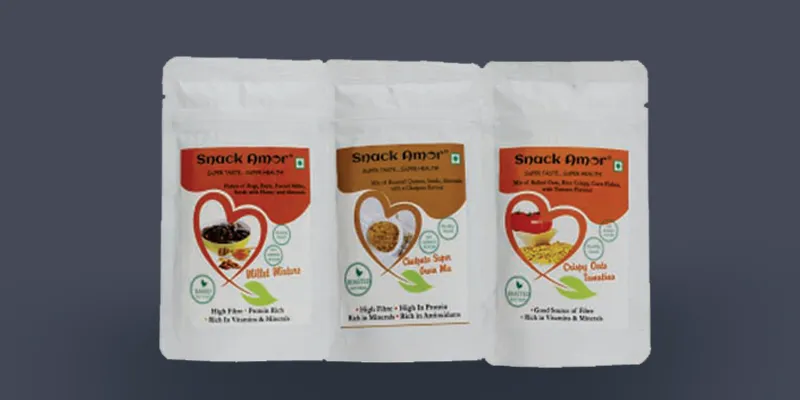Health, taste, affordability: the three main ingredients for healthy snacking in India, according to this food company
Snack Amor, founded in 2017 by Deepak Grover, aims to help India snack better. Its products include superfoods such as oats, millets, and flax seeds, among others. The company is looking to raise external funding soon.
One of the many things that unite the human race is our mutual love for snacking. Particularly in India where evening tea is a ritual, snacking perfectly accompanies the beverage, and helps quell midday cravings.
Unfortunately though snacking isn’t the healthiest habit given the food items we’re used to consuming – fried potato chips, samosas, and jalebis, among other things.
There has been a radical change in attitudes towards eating healthy in India over the last decade, and that has given birth to a whole new healthy-snacking industry. The sector has been growing at breakneck speed, but recently, people have been demanding an emphasis on nutrition too, which was absent from earlier, so-called “healthy” snacks.

Deepak Grover, Founder of Snack Amor
Snack Amor, a Mumbai-based company, touts itself as a brand that lies on the intersection of taste, affordability, and health.
A healthy snack company, Snack Amor was bootstrapped until it raised an undisclosed amount in funding in March this year from investors, including Tarek Sadi, Funding Managing Director of Endeavor, Lebanon, and an active investor and advisor to VC funds; Michael Cooke, Senior Vice President, ABB, Switzerland; Marc Deschamps, former MD and CEO of Jebson and Jesson, a leading distributor in South East Asia region; and Sapan Nainani, CEO of US-based food distribution company Mekor LLC.
It was founded in 2017 by Deepak Grover, and has tie-ups with companies such as WeWork, Reliance Retail, and Haiko.
Satiating Indian’s hunger for taste, health, and affordability
Deepak has over 15 years of experience in the food industry, having worked with brands such as US-based Univar, and The Netherlands-based Caldic.
It was during his stint at a food ingredient company in Europe that Deepak stumbled upon a realisation about the snacking industry in India – a market which, at that time, was dominated by Lays, Britannia, and Haldirams, among others.
He realised that those companies managed to hold on to their customer base because of their affordability, but at the cost of health and nutrition.
“Having dealt with the large companies during my years as a professional, I understood the mindset of these large players. They saw that we Indians love our taste buds, and therefore, they made instant gratification in taste as the agenda of their products,” Deepak said.
“They might tweak their product a bit to make it healthier, but that is where the story ends,” he added.
Snack Amor, essentially, goes back to the roots of Indian cooking, and looks for ways to make snacking healthier using stuff easily found in an Indian kitchen.
“We play around with superfoods such as seeds, turmeric, millets, and almonds, among others," says Deepak, which the company blends into its products. Protein-balance and gut health is also a focus for the company.
“All our ingredients are 100 percent natural. We mix these ingredients and either bake or roast them. None of our products are fried. A 100-gram pack of our snacks contains at least 20 grams of protein.”
Snack Amor currently has 12 varieties of snacks, from Chatpata Supergrain Mix, to Crispy Oats Tomatina. It plans to add around 18 more by the end of the year. Products by Snack Amor cost between Rs 120 to Rs 270.

Leaning on D2C Model
Snack Amor is a B2B-heavy company, considering half of its business comes from resellers. It partners with corporates to provide healthy snacking options.
“Corporates have realised that the healthier their employees are, the fewer holidays they tend to take,” says Deepak. Currently, the company has partnerships with 20 corporates.
Even though the B2B model seems to be working for the company, Deepak says D2C (direct-to-consumer) will help it scale and become a major player in the industry.
“We know that our customers would like to directly connect with us.”
To that end, Snack Amor has partnered with multi-retail outlets like Reliance, and online shopping platforms such as Amazon, Bigbasket, and Qtrove.
“India is a snacking nation, and we all love our 4 pm snack. Therefore, our target audience is diverse and they range from a health-conscious millennial, and someone who is on the go and likes to eat a healthy in-between meal snack, to a grown adult who believes in preventative healthcare,” says Deepak.
The product range includes snacks for children over the age of six.
To date, the company has sold 50,000 packets of snacks, and clocked a turnover of Rs 50 lakh.

The COVID-19 ‘blessing’
Deepak says that the formal snack market (which includes branded biscuits and chips) is worth $4 billion whereas the informal snack market (which includes assorted namkeen and popcorn) in India is worth $40 billion.
India is definitely a snack-loving market, and the COVID-19 pandemic has encouraged people to embrace healthier foods.
Deepak anoints the pandemic as a ‘blessing in disguise’ because it has spurred people to make healthier choices.
“The ongoing crisis is like a watershed moment in our space, and we clearly see a tectonic change in consumer behaviour. We expect demand for healthy, safe, and hygienic food to rise sharply.”
In the coming days, the company said it will focus on foods that can help people build immunity, replace meals, and manage their weight.
It is also looking at raising funds to build its team, expand its distribution to over a thousand retail outlets, partner with 100 corporates, strengthen its online presence, create a new product development facility to build a pipeline of new products, and grow its product offerings.
Edited by Aparajita Saxena





1551791705233.png?mode=crop&crop=faces&ar=16%3A9&format=auto&w=1920&q=75)



